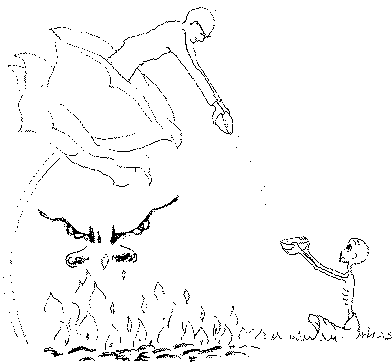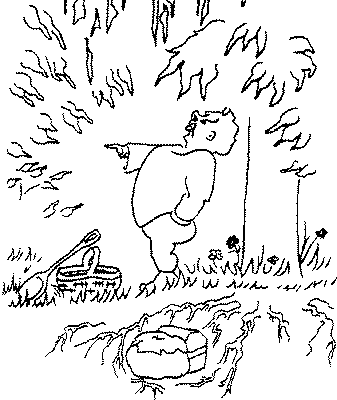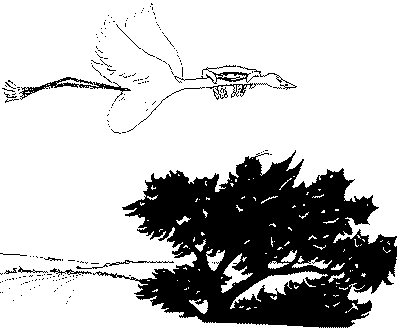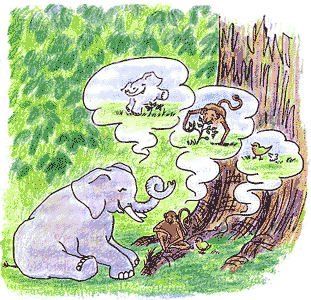40. The Silent Buddha [Generosity]
Buddhist Tales for Young and Old, volume 1, Prince Goodspeaker, Stories 1-50

Once upon a time, there was a very rich man living in Benares, in northern India. When his father died, he inherited even more wealth. He thought, “Why should I use this treasure for myself alone? Let my fellow beings also benefit from these riches."
So he built dining halls at the four gates of the city — North, East, South and West. In these halls he gave food freely to all who wished it. He became famous for his generosity. It also became known that he and his followers were practicers of the Five Training Steps.
In those days, there was a Silent Buddha meditating in the forest near Benares. He was called Buddha because he was enlightened. This means that he no longer experienced himself, the one called ‘I’ or ‘me’, as being in any way different from all life living itself. So he was able to experience life as it really is, in every present moment.
Being one with all life, he was filled with compassion and sympathy for the unhappiness of all beings. So he wished to teach and help them to be enlightened just as he was. But the time of our story was a most unfortunate time, a very sad time. It was a time when no one else was able to understand the Truth, and experience life as it really is. And since this Buddha knew this, that was why he was Silent.
While meditating in the forest, the Silent Buddha entered into a very high mental state. His concentration was so great that he remained in one position for seven days and nights, without eating or drinking.
When he returned to the ordinary state, he was in danger of dying from starvation. At the usual time of day, he went to collect alms food at the mansion of the rich man of Benares.
When the rich man had just sat down to have lunch, he saw the Silent Buddha coming with his alms bowl. He rose from his seat respectfully. He told his servant to go and give alms to him.
Meanwhile, Mara, the god of death, had been watching. Mara is the one who is filled with greed for power over all beings. He can only have this power because of the fear of death.
Since a Buddha lives life fully in each moment, he has no desire for future life, and no fear of future death. Therefore, since Mara could have no power over the Silent Buddha, he wished to destroy him. When he saw that he was near death from starvation, he knew that he had a good chance of succeeding.
Before the servant could place the food in the Silent Buddha’s alms bowl, Mara caused a deep pit of red hot burning coals to appear between them. It seemed like the entrance to a hell world.
When he saw this, the servant was frightened to death. He ran back to his master. The rich man asked him why he returned without giving the alms food. He replied, “My lord, there is a deep pit full of red hot burning coals just in front of the Silent Buddha."
The rich man thought, “This man must be seeing things!" So he sent another servant with alms food. He also was frightened by the same pit of fiery coals. Several servants were sent, but all returned frightened to death.
Then the master thought, “There is no doubt that Mara, the god of death, must be trying to prevent my wholesome deed of giving alms food to the Silent Buddha. Because wholesome deeds are the beginning of the path to enlightenment, this Mara wishes to stop me at all costs. But he does not understand my confidence in the Silent Buddha and my determination to give."
So he himself took the alms food to the Silent Buddha. He too saw the flames rising from the fiery pit. Then he looked up and saw the terrible god of death, floating above in the sky. He asked, “Who are you.?" Mara replied, I am the god of death!"
“Did you create this pit of fire?" asked the man. “I did," said the god. “Why did you do so?" “To keep you from giving alms food, and in this way to cause the Silent Buddha to die! Also to prevent your wholesome deed from helping you on the path to enlightenment, so you will remain in my power!"
The rich man of Benares said, “Oh Mara, god of death, the evil one, you cannot kill the Silent Buddha, and you cannot prevent my wholesome giving! Let us see whose determination is stronger!"
Then he looked across the raging pit of fire, and said to the calm and gentle Enlightened One, “Oh Silent Buddha, let the light of Truth continue to shine as an example to us. Accept this gift of life!"
So saying, he forgot himself entirely, and in that moment there was no fear of death. As he stepped into the burning pit, he felt himself being lifted up by a beautiful cool lotus blossom. The pollen from this miraculous flower spread into the air, and covered him with the glowing colour of gold. While standing in the heart of the lotus, the Great Being poured the alms food into the bowl of the Silent Buddha. Mara, god of death, was defeated!
In appreciation for this wonderful gift, the Silent Buddha raised his hand in blessing. The rich man bowed in homage, joining his hands above his head. Then the Silent Buddha departed from Benares, and went to the Himalayan forests.
Still standing on the wonderful lotus, glowing with the color of gold, the generous master taught his followers. He told them that practising the Five Training Steps is necessary to purify the mind. He told them that with such a pure mind, there is great merit in giving alms — indeed it is truly the gift of life!
When he had finished teaching, the fiery pit and the lovely cool lotus completely disappeared.
The moral is: Have no fear when doing wholesome deeds.
40. The Silent Buddha [Generosity]
Link: https://hhdorjechangbuddhaiiiinfo.com/2022/10/18/40-the-silent-buddha-generosity/
INTERPRETER’S INTRODUCTION – BUDDHIST TALES FOR YOUNG AND OLD, VOLUME 1, STORIES 1-50
#Buddhisttalesforyoungandold #Buddhiststories #storiesforkids #moralstories #Buddha #Jatakastories #PansiyaPanasJataka


